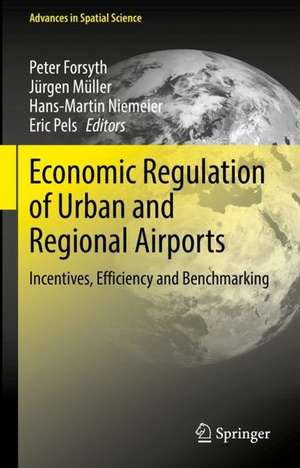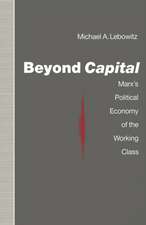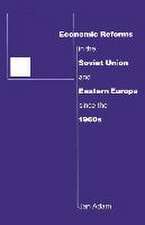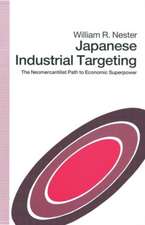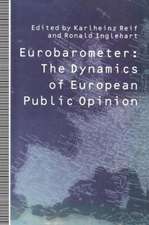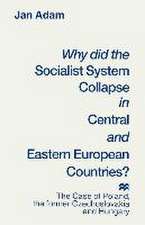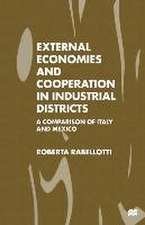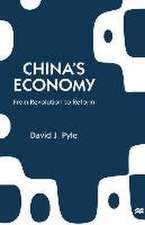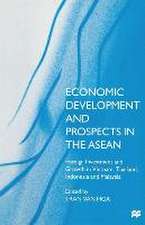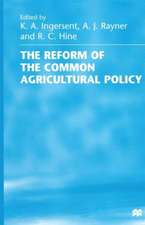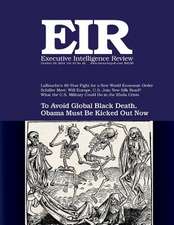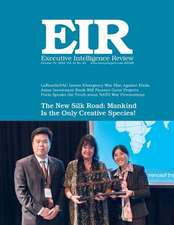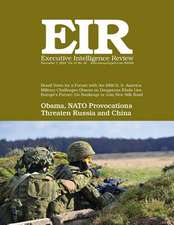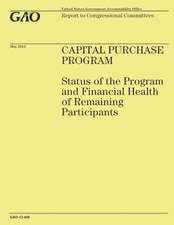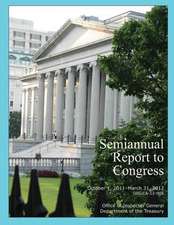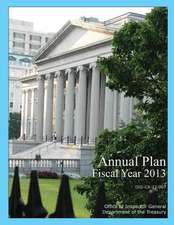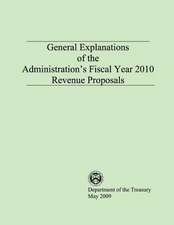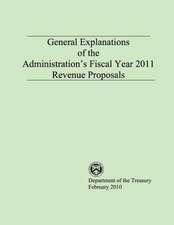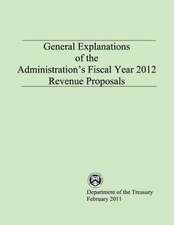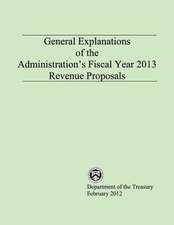Economic Regulation of Urban and Regional Airports: Incentives, Efficiency and Benchmarking: Advances in Spatial Science
Editat de Peter Forsyth, Jürgen Müller, Hans-Martin Niemeier, Eric Pelsen Limba Engleză Hardback – 3 mai 2023
Addressing the question of whether and how European airport regulators set incentives for efficiency, and how benchmarking is used in the regulatory process, this book is an important contribution to the development of the transport industry in Europe and Latin America. It will appeal to scholars and students in transport economics, regional economics and related fields, as well as to practitioners and policy makers in the transport industry.
Din seria Advances in Spatial Science
-
 Preț: 368.91 lei
Preț: 368.91 lei - 18%
 Preț: 963.47 lei
Preț: 963.47 lei - 18%
 Preț: 948.16 lei
Preț: 948.16 lei - 18%
 Preț: 947.67 lei
Preț: 947.67 lei - 18%
 Preț: 940.72 lei
Preț: 940.72 lei - 18%
 Preț: 954.45 lei
Preț: 954.45 lei - 15%
 Preț: 646.62 lei
Preț: 646.62 lei - 18%
 Preț: 959.50 lei
Preț: 959.50 lei - 18%
 Preț: 956.33 lei
Preț: 956.33 lei - 18%
 Preț: 949.23 lei
Preț: 949.23 lei - 15%
 Preț: 646.75 lei
Preț: 646.75 lei - 15%
 Preț: 643.99 lei
Preț: 643.99 lei - 18%
 Preț: 955.40 lei
Preț: 955.40 lei - 15%
 Preț: 643.00 lei
Preț: 643.00 lei - 15%
 Preț: 644.49 lei
Preț: 644.49 lei - 18%
 Preț: 953.35 lei
Preț: 953.35 lei - 18%
 Preț: 956.03 lei
Preț: 956.03 lei - 15%
 Preț: 647.27 lei
Preț: 647.27 lei - 15%
 Preț: 638.24 lei
Preț: 638.24 lei - 18%
 Preț: 961.23 lei
Preț: 961.23 lei - 18%
 Preț: 954.93 lei
Preț: 954.93 lei - 15%
 Preț: 643.48 lei
Preț: 643.48 lei - 18%
 Preț: 955.70 lei
Preț: 955.70 lei - 15%
 Preț: 650.86 lei
Preț: 650.86 lei - 15%
 Preț: 650.04 lei
Preț: 650.04 lei - 15%
 Preț: 648.42 lei
Preț: 648.42 lei - 18%
 Preț: 949.42 lei
Preț: 949.42 lei - 18%
 Preț: 960.30 lei
Preț: 960.30 lei - 18%
 Preț: 948.29 lei
Preț: 948.29 lei - 18%
 Preț: 958.07 lei
Preț: 958.07 lei - 18%
 Preț: 950.66 lei
Preț: 950.66 lei - 18%
 Preț: 956.03 lei
Preț: 956.03 lei - 15%
 Preț: 643.65 lei
Preț: 643.65 lei - 18%
 Preț: 956.99 lei
Preț: 956.99 lei - 18%
 Preț: 956.81 lei
Preț: 956.81 lei - 18%
 Preț: 958.73 lei
Preț: 958.73 lei - 18%
 Preț: 959.98 lei
Preț: 959.98 lei - 18%
 Preț: 952.40 lei
Preț: 952.40 lei - 15%
 Preț: 643.00 lei
Preț: 643.00 lei
Preț: 1121.94 lei
Preț vechi: 1368.21 lei
-18% Nou
Puncte Express: 1683
Preț estimativ în valută:
214.68€ • 224.14$ • 177.68£
214.68€ • 224.14$ • 177.68£
Carte tipărită la comandă
Livrare economică 05-19 aprilie
Preluare comenzi: 021 569.72.76
Specificații
ISBN-13: 9783031203398
ISBN-10: 3031203399
Ilustrații: XII, 448 p. 1 illus.
Dimensiuni: 155 x 235 mm
Greutate: 0.82 kg
Ediția:1st ed. 2023
Editura: Springer International Publishing
Colecția Springer
Seria Advances in Spatial Science
Locul publicării:Cham, Switzerland
ISBN-10: 3031203399
Ilustrații: XII, 448 p. 1 illus.
Dimensiuni: 155 x 235 mm
Greutate: 0.82 kg
Ediția:1st ed. 2023
Editura: Springer International Publishing
Colecția Springer
Seria Advances in Spatial Science
Locul publicării:Cham, Switzerland
Cuprins
- 1. Introduction. - Part I Theoretical Background: Market Power and Regulation. - 2. How Strong Is Airport Competition: Is There a Case for Regulation?. - 3. European Hub Airport Competition: An Assessment of Market Concentration in the Local Catchment and in the Transfer Market. - 4. The Transactions Costs Foundation for Public Utility Regulation and Its Application to the Regulation of Airports. - 5. Cost-Based Versus Incentive Regulation for Airports. - 6. Airport Privatization and Regulation: Effects on Airport Charge, Capacity, and Social Welfare. - 7. Light-Handed Regulation of Airports: The Way to Go?. - 8. Optimising Investment in Regulated Airports. - 9. European Airport Reform: Slots and the Implicit Contract Between Airlines and Airports. - Part II Benchmarking. - 10. Efficiency Assessment of Airports and the Impact of Regulation on Performance. - 11. Methodology Choices for Benchmarking Airports. - 12. Practical Difficulties in Airport Benchmarking: The Case of Dublin Airport. - Part III Country Studies. - 13. Economic Regulation of Airports in the United Kingdom. - 14. French Airports Case Study. - 15. Airport Regulation and Benchmarking: Case Study Germany. - 16. Airport Market Power: Schiphol 10 Years After the Assessment. - 17. Changing Governance and Regulation of Airports: A Comparison of Austria, Denmark, Italy, Hungary, Portugal, and Spain. - 18. Private Participation and Economic Regulation of Airports in Latin America. - 19. Conclusion.
Notă biografică
Peter Forsyth has been at Monash University since 1997, originally as Professor of Economics, and since 2014 as Adjunct Professor. Much of his research has been on Transport Economics, and especially on the Economics of Aviation. He has published widely in both tourism and aviation, including Tourism Economics and Policy, Second Edition, (with L Dwyer and W Dwyer, Channel View, 2020). In recent years he has done considerable research on economic policies to reduce emissions of aviation, and recently published Aviation and Climate Change: Economic Perspectives on Greenhouse Gas Reduction Polices (with F Fichert and H-M Niemeier, Routledge, 2020). He has also done extensive work using Computable General Equilibrium models to analyse aviation policy issues. In 2015 he was made a Fellow of the Air Transport Research Society. Jürgen Müller obtained his PhD from Stanford and then worked at the Science Center Berlin (WZB), the German Institute for Economic Research (DIW) and the Berlin School of Economics and Law (HWR), at the International Telecommunication Union (ITU) and at Sussex University. He also taught at the Universities of Bonn, Bremen, Paris-Sorbonne, INSEAD, Stanford, UC Berkeley and the College of Europe/Natolin. Concerning aviation, he has worked on air traffic control issues for the Association of European Airlines and for the European Union and as a co-director of the German Aviation Project (GAP) on governance and productivity topics. He was a co-founder of the European Association of Industrial Economics (EARIE) and the International Telecommunications Society (ITS) and a vice chair of GARS, the German Aviation Research Society.
Hans-Martin Niemeier is a Director of the Institute for Transport and Development at Bremen University of Applied Sciences. He is Chairman of the German Aviation Research Society and member of the Advisory Board of the EuropeanAviation Conference. He chaired the COST Action “Air Transport and Regional Development”. From 2014 to May 2019, he was member of the Performance Review Body of the Single European Sky. He has published on privatisation, regulation and competition of airports, the reform of slot allocation and on airline and airport alliances.
Eric Pels is Associate Professor at the Department of Spatial Economic of VU University. He obtained his PhD in 2000 from VU University. The title of the doctoral dissertation was: "Airport economics and policy: efficiency, competition, and interaction with airlines". With this dissertation he was the winner of the Regional Science Association International (RSAI) Dissertation Competition, 2000. Currently he teaches various courses at the bachelor’s and master’s level. These courses include transport economics, airline business and micro economics. His research focuses on the development of transport (mostly airline) networks, pricing transport network and pricing of infrastructure. He chaired the 2019 ATRS conference. He also is editor submitted papers for Transport Policy.
Hans-Martin Niemeier is a Director of the Institute for Transport and Development at Bremen University of Applied Sciences. He is Chairman of the German Aviation Research Society and member of the Advisory Board of the EuropeanAviation Conference. He chaired the COST Action “Air Transport and Regional Development”. From 2014 to May 2019, he was member of the Performance Review Body of the Single European Sky. He has published on privatisation, regulation and competition of airports, the reform of slot allocation and on airline and airport alliances.
Eric Pels is Associate Professor at the Department of Spatial Economic of VU University. He obtained his PhD in 2000 from VU University. The title of the doctoral dissertation was: "Airport economics and policy: efficiency, competition, and interaction with airlines". With this dissertation he was the winner of the Regional Science Association International (RSAI) Dissertation Competition, 2000. Currently he teaches various courses at the bachelor’s and master’s level. These courses include transport economics, airline business and micro economics. His research focuses on the development of transport (mostly airline) networks, pricing transport network and pricing of infrastructure. He chaired the 2019 ATRS conference. He also is editor submitted papers for Transport Policy.
Textul de pe ultima copertă
This book offers new insights into the theory and practice of economic airport regulation. In light of recent developments in aviation markets and policy, and the debate on airport regulation and benchmarking, it offers case studies on various aspects of economic regulation of city and regional airports. Written by experts in the field, the volume features contributions on the theory of regulation and benchmarking, as well as case studies on recent experiences in Europe and Latin America.
This book is divided into three parts: Part I provides the theoretical background for the study of airport regulation and regulatory systems. Competition at airports is discussed, as are common forms of regulation and potential pitfalls. Part II addresses benchmarking, as benchmarking is often applied as an input to the regulatory process. Although benchmarking is necessary, reviews of how benchmarking is applied in the literature and in practice show that improvements can be made. Part III providescase studies on real-world examples.
Addressing the question of whether and how European airport regulators set incentives for efficiency, and how benchmarking is used in the regulatory process, this book is an important contribution to the development of the transport industry in Europe and Latin America. It will appeal to scholars and students in transport economics, regional economics and related fields, as well as to practitioners and policy makers in the transport industry.
Addressing the question of whether and how European airport regulators set incentives for efficiency, and how benchmarking is used in the regulatory process, this book is an important contribution to the development of the transport industry in Europe and Latin America. It will appeal to scholars and students in transport economics, regional economics and related fields, as well as to practitioners and policy makers in the transport industry.
Caracteristici
Offers new insights into the theory and practice of economic airport regulation Presents case studies in Europe and Latin America Disccuses how benchmarking is used in the regulatory process
